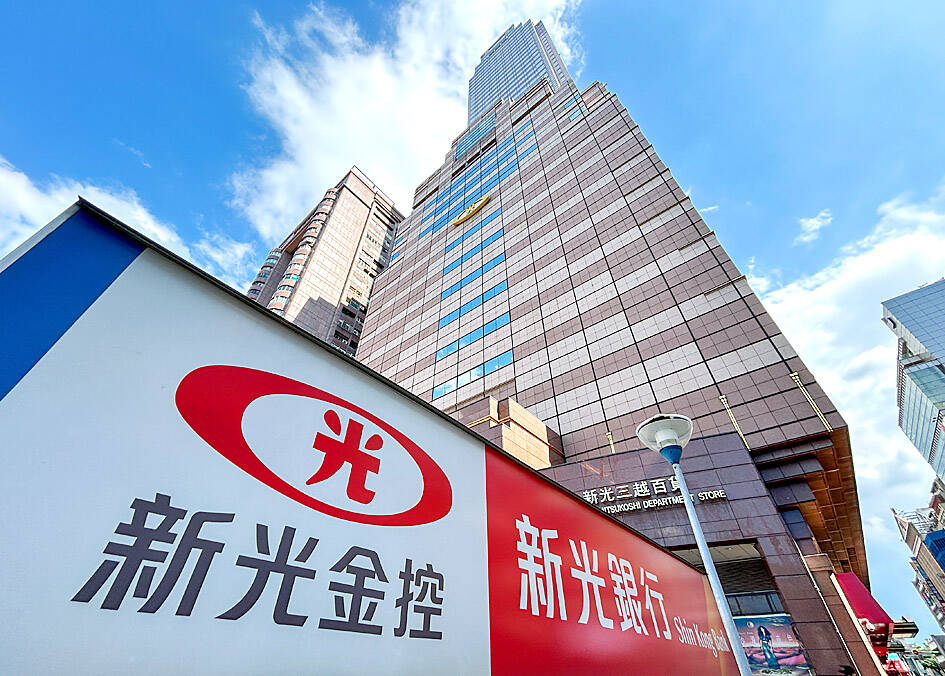Shin Kong Financial Holding Co (新光金控), Taiwan’s fifth-largest financial conglomerate, returned to a profit of NT$20.5 billion (US$639.39 million) in the first half of the year as it faces rival takeover bids.
The financial group’s insurance unit was helped by capital gains on stocks and improved hedging costs, it said in a statement yesterday.
Earnings per share of NT$1.32 compared with losses per share of NT$0.41 a year earlier.

Photo: CNA
Shin Kong is at the heart of a bidding war between CTBC Financial Holding Co (中信金控), which has offered about US$4.1 billion in cash and stock for a 51 percent stake, and a lower, mutually agreed deal with Taishin Financial Holding Co (台新金控).
Shin Kong Financial president Stephen Chen (陳恩光) yesterday said that the group’s preference was for a deal with Taishin Financial.
“Shin Kong wants a merger to deliver sustainable development and won’t necessarily prioritize a higher offer,” Chen said at an earnings conference in Taipei.
“Shin Kong has had a longer relationship with Taishin in terms of deal talks” and a successful “marriage” requires mutual understanding, he said.
Shin Kong Financial, whose founder was a brother of Taishin Financial’s founder, would keep discussing a merger with Taishin, including a potential tweak of their agreed share-swap ratio to make the deal more attractive, Chen said.
“There is only one consensus merger company for Shin Kong Financial, that’s Taishin Financial,” Shin Kong Financial said in a separate statement released at the conference, denouncing CTBC Financial’s offer as a “raid.”
The first-half result underscores the attraction of Shin Kong Financial, which had an uneven performance during the COVID-19 pandemic. A successful bid would help CTBC Financial vault over two bigger firms to become the nation’s biggest financial company.
At least five analysts had downgraded their recommendations on CTBC Financial stock after its bid last month on concerns that it is seeking a business that would need injections of capital and a lot of management attention.
Separate results last month from Shin Kong Financial’s life insurance unit showed its capital adequacy ratio had rebounded to above 200 percent, meeting regulatory requirements.

To many, Tatu City on the outskirts of Nairobi looks like a success. The first city entirely built by a private company to be operational in east Africa, with about 25,000 people living and working there, it accounts for about two-thirds of all foreign investment in Kenya. Its low-tax status has attracted more than 100 businesses including Heineken, coffee brand Dormans, and the biggest call-center and cold-chain transport firms in the region. However, to some local politicians, Tatu City has looked more like a target for extortion. A parade of governors have demanded land worth millions of dollars in exchange

An Indonesian animated movie is smashing regional box office records and could be set for wider success as it prepares to open beyond the Southeast Asian archipelago’s silver screens. Jumbo — a film based on the adventures of main character, Don, a large orphaned Indonesian boy facing bullying at school — last month became the highest-grossing Southeast Asian animated film, raking in more than US$8 million. Released at the end of March to coincide with the Eid holidays after the Islamic fasting month of Ramadan, the movie has hit 8 million ticket sales, the third-highest in Indonesian cinema history, Film

BIG BUCKS: Chairman Wei is expected to receive NT$34.12 million on a proposed NT$5 cash dividend plan, while the National Development Fund would get NT$8.27 billion Taiwan Semiconductor Manufacturing Co (TSMC, 台積電), the world’s largest contract chipmaker, yesterday announced that its board of directors approved US$15.25 billion in capital appropriations for long-term expansion to meet growing demand. The funds are to be used for installing advanced technology and packaging capacity, expanding mature and specialty technology, and constructing fabs with facility systems, TSMC said in a statement. The board also approved a proposal to distribute a NT$5 cash dividend per share, based on first-quarter earnings per share of NT$13.94, it said. That surpasses the NT$4.50 dividend for the fourth quarter of last year. TSMC has said that while it is eager

‘IMMENSE SWAY’: The top 50 companies, based on market cap, shape everything from technology to consumer trends, advisory firm Visual Capitalist said Taiwan Semiconductor Manufacturing Co (TSMC, 台積電) was ranked the 10th-most valuable company globally this year, market information advisory firm Visual Capitalist said. TSMC sat on a market cap of about US$915 billion as of Monday last week, making it the 10th-most valuable company in the world and No. 1 in Asia, the publisher said in its “50 Most Valuable Companies in the World” list. Visual Capitalist described TSMC as the world’s largest dedicated semiconductor foundry operator that rolls out chips for major tech names such as US consumer electronics brand Apple Inc, and artificial intelligence (AI) chip designers Nvidia Corp and Advanced